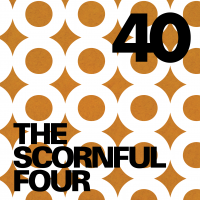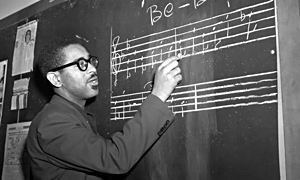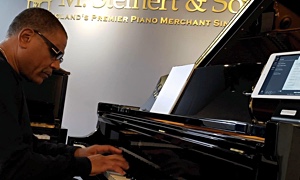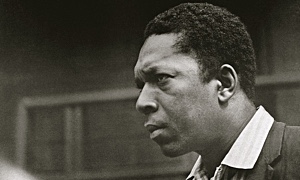Home » Jazz Articles » Jazz Primer » The New Shape of Jazz
The New Shape of Jazz
With every development throughout jazz, there has been a reluctance to adapt to the current ideas.
With every development throughout jazz, there has been a reluctance to adapt to the current ideas. It happened with bop. It happened with fusion and it will happen again. One prediction for the future of jazz is a more in depth exploration of the electronica music realm. In fact, there are many similarities between jazz lovers and electronica lovers. Jazz lovers are notorious for taking the music with the utmost seriousness and attempt, at times, to out-do their peers with their vast knowledge of obscure albums and finding that secret album with the all-star band that no one has heard. If you've been in a record store (one that actually still sells vinyl), you will see the same mentality from electronica lovers. Electronica rivals jazz with the amount of sub-genres and artists you have to know about to be a serious listener. In fact, the genre known as drum 'n' bass has been called the "jazz" of electronica because of its complex rhythms and melodic developments. You probably won't see Sonny Rollins out there cutting a drum 'n' bass album anytime soon but I predict that it will begin to come to the forefront and will begin to bridge the gaps between two seemingly opposite ends of the spectrum. Already, live electronica bands are popping up in places like New York, San Francisco and Seattle.
I also see the continuation of some crossover improvisation-based "jam" bands to help nurture jazz. These musicians and their audiences greatly appreciate jazz and carry the torch but in a conventional way at all. Bands such as Phish, Bela Fleck and The Jazz Mandolin Project have already introduced thousands to the world of improvisational music. There has been a long line of tradition linking jazz with experimental rock bands. Miles Davis opened up for Santana and the Grateful Dead in the seventies; Jerry Garcia recorded an album with Ornette Coleman; and Phish introduced thousands of people to the groove-thick jazz trio of Medeski, Martin and Wood. People like MMW, Charlie Hunter and John Scofield have embraced there new fans and enjoy great turnouts at every show they play.
As far as innovative, pure acoustic jazz, look no further than John Zorn and his cohorts. It seems like every week Zorn has a new album out trying to push the boundaries. He has surrounded himself with a core of extremely talented and creative musicians that have not only helped him create his music, but also are searching for there own voices. With people like Dave Douglas, Elliot Sharp, Joey Baron and countless others around, we don't need to worry about jazz becoming stale. They have also initiated a very interesting revisit to the world of Jewish Klezmer music. If you have seen a show by Zorn's Masada, The New Orleans Klezmer All-Stars or The Hasidic New Wave, then you know that improvisational music is certainly not dying. At a recent Masada show, I was sitting between a punk rocker and a seventy-year-old lady. Both were having a great time listening to the music through very different sets of ears.
Jazz will survive in the next hundred years. It will probably survive the next hundred after that, as well. But it needs to attract the kind of musicians eager for creativity and at the same time aware of the current state of society and give the music freshness necessary to avoid looking at it as a relic from the past. It will also demand an audience that is seeking sounds away from the industry standard. The smell seems to be dissipating from jazz, but it will always need some housekeeping to avoid spoilage.
Tags
PREVIOUS / NEXT
Support All About Jazz
 All About Jazz has been a pillar of jazz since 1995, championing it as an art form and, more importantly, supporting the musicians who make it. Our enduring commitment has made "AAJ" one of the most culturally important websites of its kind, read by hundreds of thousands of fans, musicians and industry figures every month.
All About Jazz has been a pillar of jazz since 1995, championing it as an art form and, more importantly, supporting the musicians who make it. Our enduring commitment has made "AAJ" one of the most culturally important websites of its kind, read by hundreds of thousands of fans, musicians and industry figures every month.
























